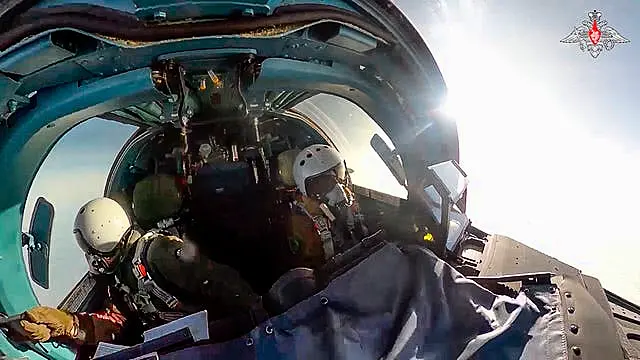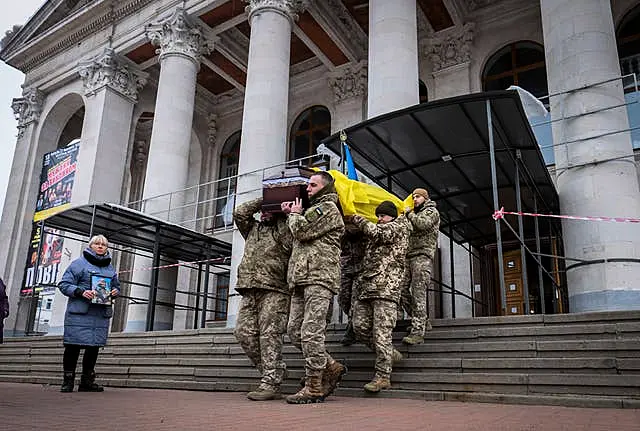Russia has conducted a “massive” attack against Ukraine’s energy infrastructure, firing nearly 200 missiles and drones and leaving more than a million households without power, Ukrainian officials said.
Russia’s second major aerial attack on Ukraine’s power grid in less than two weeks amplified fears that the Kremlin aims to cripple the country’s power generation capacity before winter.
Energy Minister Herman Halushchenko said on Facebook: “Attacks on energy facilities are happening all over Ukraine”.
The Commander of the Air Force, along with the Ministers of Internal Affairs and Energy, provided reports regarding the aftermath of the latest Russian strike targeting our energy infrastructure. In total, approximately 100 strike drones and over 90 missiles of various types were… pic.twitter.com/gClYnks7or
— Volodymyr Zelenskyy / Володимир Зеленський (@ZelenskyyUa) November 28, 2024
He added that emergency power outages were implemented nationwide.
Russia in previous years has targeted Ukraine’s electricity generation, aiming to deny civilians critical heating and drinking water supplies during the bitter winter months and break Ukrainian spirits.
The attacks also seek to hobble Ukraine’s defence industry as it produces missiles, drones and armoured vehicles, among other military assets.
In some regions on Thursday, Kalibr cruise missiles with cluster munitions smashed into civilian targets, Ukrainian President Volodymyr Zelensky said, calling it “an insidious escalation”.
Cluster munitions release numerous small bombs over a wide area, making them dangerous to civilians both during and after an attack.
Russian President Vladimir Putin claimed his forces struck 17 Ukrainian targets on Thursday, including military facilities and their “support systems,” with 100 drones and 90 missiles.
But the Ukrainian air force claimed to have shot down 76 cruise missiles and three other types of missile as well as 32 drones.
It added that it lost track of 62 Russian drones, which were most likely jammed by electronic warfare.
Ukrainian officials have warned recently that Russia was stockpiling cruise and ballistic missiles, presumably for another pre-winter aerial campaign against Ukraine’s power grid.
Ukrainian officials have in the past accused Russia of “weaponising winter”. Such massive attacks have been a regular feature of the war.
Around half of Ukraine’s energy infrastructure has been destroyed during almost three years of war with Russia, and rolling electricity blackouts are common. Kyiv’s Western allies have sought to help Ukraine protect power generation with air defence systems and funds for rebuilding.

The war has been going in Russia’s favour in recent months as its bigger army uses its advantages in manpower and equipment to push Ukrainian forces backward in eastern areas, though its offensive has been slow and costly.
Mr Putin said that over the past two days Russia had fired 100 missiles and 466 drones at Ukraine, saying they were a response to Ukraine using American-made missiles to hit targets on Russian soil after gaining permission to do so from President Joe Biden.
Speaking at a summit in Kazakhstan of a security alliance of former Soviet nations, Mr Putin threatened to use a new intermediate-range ballistic missile, called Oreshnik, against “decision-making centres” in Kyiv, the Ukrainian capital.
The missile launched for the first time at Ukraine last week has six warheads and flies at 10 times the speed of sound, according to Putin, who declared that it can’t be intercepted by any modern air defence systems.
Explosions in Thursday’s Russian attack were reported in Kyiv, Kharkiv, Rivne, Khmelnytskyi, Lutsk, and many other cities in central and western Ukraine.
Mr Zelensky urged Western countries to accelerate delivery of promised air defence weaponry. Ukrainian officials in the past have grumbled that military aid is slow to arrive.

“Each such attack proves that air defence systems are needed now in Ukraine, where they save lives, and not at storage bases,” Mr Zelensky said on the Telegram messaging app.
The head of Ukraine’s presidential office, Andrii Yermak, said in a Telegram post that Russia had stockpiled missiles to strike Ukrainian infrastructure and wage war against civilians during the cold season. “They were helped by their crazy allies, including from North Korea,” he wrote.
Western governments and South Korea say North Korea in recent months has intensified its military support for Russia.
The head of the Lviv region in western Ukraine, Maksym Kozytskyi, said the attack left more than half a million households without electricity.
Over 280,000 households in the north-western Rivne region were without electricity because of the attack, according to regional governor Oleksandr Koval. Running water supplies were also patchy in affected areas. Some schools in Rivne city switched to online classes.
There were also strikes on the bordering Volyn region, where 215,000 households had no electricity, regional head Ivan Rudnytskyi said.
All critical infrastructure that lost power was switched to generators.
Energy infrastructure was also targeted in the western Ivano-Frankivsk region, local officials said. Air defences were activated there, and emergency power outages were introduced.
Local officials ordered the opening of “points of invincibility” – shelter-type places where people can charge their phones and other electrical devices and get refreshments during blackouts.
In Kyiv, where the air raid alert lasted over nine hours, missile debris fell in one neighbourhood, local officials said. No casualties were reported.




